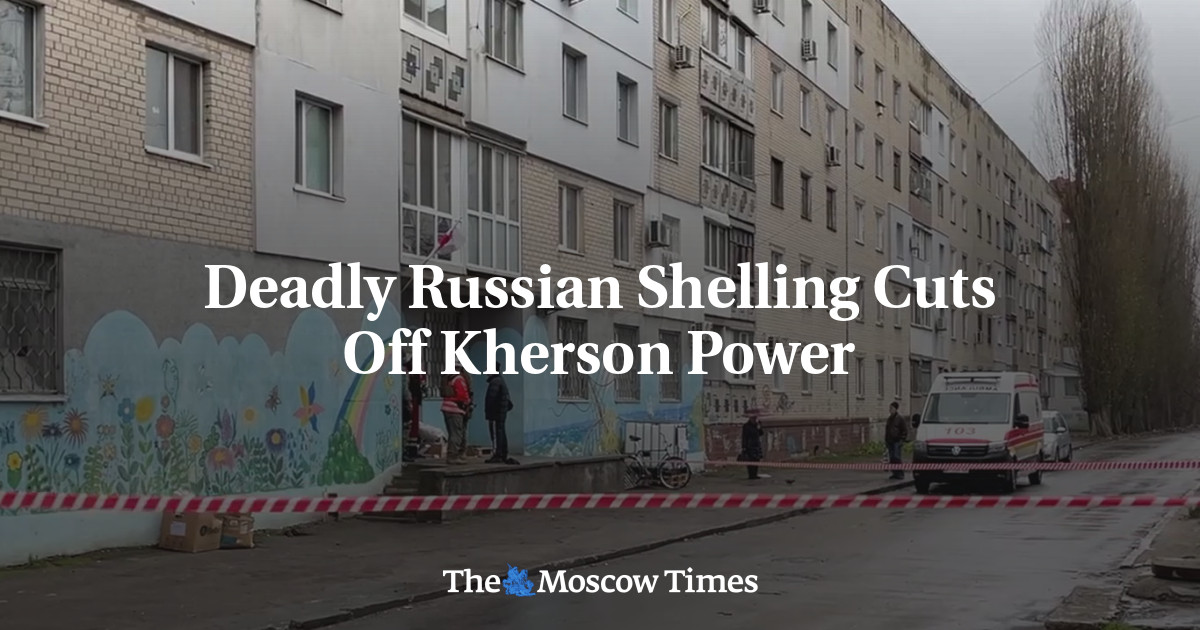
Russian forces bombarded Kherson on Thursday, killing two people and depriving the Ukrainian city of electricity as the European Union announced its latest slew of sanctions against Moscow and an 18 billion euro aid package for Kyiv.
Moscow-allied officials in the Russian-occupied city of Donetsk, meanwhile, said they have come under some of the heaviest shelling in years from Ukrainian forces, leaving one person dead.
Despite Russia’s retreat from the southern port city in November, Kherson remains within reach of Moscow’s weaponry and under constant threat.
Ukrainian President Volodymyr Zelensky said Russian forces had attacked Kherson 16 times on Thursday alone.
The International Committee of the Red Cross confirmed that one of its Ukrainian team members had been killed by the strikes and urged that humanitarian “personnel and property” be spared.
While winter temperatures plunge below freezing, the heavy shelling has left Kherson “completely without power,” according to regional governor Yaroslav Yanushevych.
Much of Ukraine is struggling without heat or power after Moscow started targeting electricity and water systems nearly two months ago.
The UN human rights chief warned the campaign has inflicted “extreme hardship” on Ukrainians this winter, and also decried likely war crimes as he described his office’s documentation of civilians killed by Russian forces.
“Winter is coming, how can people survive?,” Svetlana, a resident of the capital, told AFP. “Lord, what do they want from us? They do not let Ukrainians live.”
Summary killings
UN rights chief Volker Turk said his office has documented the executions and direct killings of 441 civilians across three regions of Ukraine from the start of Russia’s invasion on Feb. 24 until April 6.
The “actual figures are likely to be considerably higher”, he said, adding “there are strong indications that the executions… may constitute the war crime of willful killing.”
Beyond that initial period, Turk said his team had continued to document gross rights violations affecting both civilians and combatants, including arbitrary detention, enforced disappearances, torture and sexual violence.
So far, he added, “accountability remains sorely lacking.”
He also warned of further displacements as Russian attacks on critical infrastructure leave people without power or clean water.
“Additional strikes could lead to a further serious deterioration in the humanitarian situation and spark more displacement,” he said.
An estimated 18 million Ukrainians are already in need of humanitarian aid.
Kyiv expected to be targeted again
Ukrainian commander-in-chief General Valeriy Zaluzhny told British weekly The Economist they expected a fresh Russian assault on Kyiv in the early months of 2023.
Kyiv was the primary target when the Russians first invaded on Feb. 24. But their northern campaign, launched from Belarus, was rebuffed by a gritty Ukrainian counter-offensive that preserved the seat of government.
“The Russians are preparing some 200,000 fresh troops. I have no doubt they will have another go at Kyiv,” Zaluzhny said.
Russia has appeared to pump up its presence anew in Belarus in recent weeks, according to US-based conflict monitor the Institute for the Study of War.
But it said exercises and deployments do not likely indicate plans by Belarusian forces to attack northern Ukraine themselves.
Instead, the actions “are likely part of ongoing Russian information operations” to keep Kyiv nervous and force it to maintain significant force levels in the north, far from the active front lines, according to ISW.
Blasts in Donetsk
Having retreated from parts of southern Ukraine, Moscow’s forces have since engaged in fierce battles in the east, particularly in the Donetsk region.
The region has been partly controlled by Moscow-backed separatists since 2014.
On Thursday, local Russia-aligned authorities reported “the most massive shelling since 2014” in the regional capital, Donetsk city.
At least one person was killed and nine more injured in the strikes, they said.
In Donetsk, “the epicenter of the fighting remains the Bakhmut and Avdiivka directions,” Ukraine deputy defense minister Ganna Malyar told a briefing.
“The enemy is hard to beat,” Petro, a Ukrainian military unit chief in the area, told AFP.
“Staying on the frontline is very difficult. They sustain heavy losses, but so do we.”
International support
The EU unleashed its ninth wave of sanctions on Russia Thursday, blacklisting “almost 200” individuals and entities, targeting three banks, curbing mining investments and banning more TV channels.
But diplomats have warned that the bloc is increasingly running out of ways to hurt the Russian economy as the war drags towards its 10th month.
The EU also cleared the way to giving Ukraine another 18 billion euros ($19 billion) in aid following an impassioned plea from Zelensky.
In Washington, the Pentagon announced it will expand training for Ukrainian forces in Germany to about 500 persons per month focused on larger-scale maneuvers and specific weapons systems.
The new effort will “include joint maneuver and combined arms operations training while building upon the specialized equipment training that we’re already providing,” Pentagon press secretary Pat Ryder said.
Ryder would not confirm expectations that the United States will provide advanced Patriot air defense batteries to Ukraine, which would bring added protection against Russian cruise missiles as well as tactical ballistic missiles Moscow is believed to be seeking from Iran.